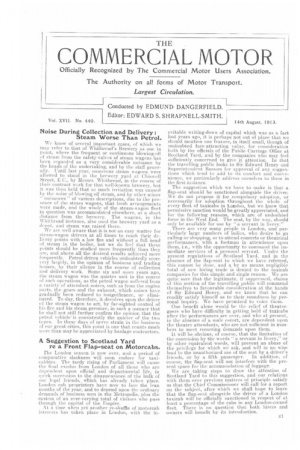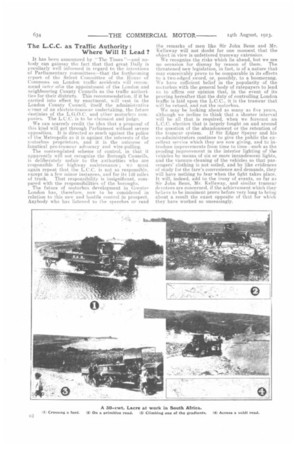Noise During Collection and Delivery : Steam Worse Than Petrol.
Page 1

Page 2

If you've noticed an error in this article please click here to report it so we can fix it.
We know of several important cases, of which we may refer to that of Whitbread's Brewery as one in point, where the frequent or continuous blowing-off of steam from the safety-valves of steam wagons has been regarded as a very considerable nuisance by theheads of the undertaking, and by the staff generally. Until last year, numerous steam wagons were allowed to stand in the brewery yard at Chiswell Street., E.C., by Messrs. Whitbread, in the course of their contract work for that well-known brewery, hut it was then held that so much irritation was caused by the noise of blowing-off steam, and by other minor " nuisances " of various descriptions, due to the presence of the steam wagons, that fresh arrangements were made, and the whole of the steam-wagon fleet in question was accommodated elsewhere, at a short distance from the brewery. The wagons, in the Whitbread instance, also used the brewery yard as a depot, and steam was raised there.
We are well aware that it is not an easy matter for steam-wagon drivers at all times to reach their delivery points with a low fire and without a full head of steam in the boiler, but we do feel that these points should be studied more frequently than they are, and above all the desired results achieved more frequently. Petrol drivenvehicles undoubtedly score very largely, in the opinion of business and trading houses, by their silence in the course of collection and delivery work. Some six and more years ago, the steam wagon was the quieter unit in the course of such operations, as the petrol wagon suffered from a variety of attendant noises, such as from the engine parts, the gears and the exhaust, which noises have gradually been reduced to insignificance, or eliminated. To-day, therefore, it devolves upon the driver of the steam wagon to act, by far-sighted control of his fire and his steam pressure, in such a manner that he shall not still further confirm the opinion that the petrol vehicle is consistently the quieter of the two types. In these days of nerve strain in the business of our great cities, this point is one that counts much more than may be appreciated by haulage contractors.
A Suggestion to Scotland Yard re a Front Flap-seat on Motorcabs.
The London season is now over, and a period of comparative slackness will soon endure for taxicabbies. The tardy rising of Parliament will cause the final exodus from London of all those who are dependent upon official and departmental life, in quick succession to the disappearance of the bulk of our legal friends, which has already taken place. London cab proprietors have now to face the Ivan months of the year, and to depend upon the ordinary demands of business men in the Metropolis, plus the, custom of an ever-varying total of visitors who pass through the capital of the Empire.
At a time when yet another re-shuffle of motorcab interests has taken placein London; with the in evitable writing-down of capital which was as a fact lost years ago, it is perhaps not out Of place that we should mention one feature, in itself small, though of undoubted fare-attracting value, for consideration both by the officials of the Public Carriage Office at Scotland Yard, and by the companies who may feel sufficiently concerned to give it attention. In that the travelling public looks to Sir Edward Henry and Superintendent BaSSCIIII for approval of any suggestions which tend to add to its comfort and convenience, we particularly address ourselves to them in the first instance.
The suggestion which we have to make is that a flap-seat should be sanctioned alongside the driver. We do net propose it for eoruptilsory adoption, or necessarilyfor adoption throughout the whole of every fleet of taxicabs in London, but we know that permissive sanction would be greatly appreciated, and for the following reasons, which are of undoubted force in the West End. The seat, by the way, should only be available for use by "a servant in livery!'
There are very many people in London, and particularly large numbers of ladies, who desire to go calling or shopping, or to attend concerts or theatrical performances, with a footman in attendance upon them, i.e., with the opportunity to command the immediate services of a personal servant. Under the Present regulations of Scotland Yard, and in the absenc.e of the nap-seat to which we have referred, this cannot be alooe, and a by no means negligible total of new hiring trade is denied to the taxicab companies for this simple and single reason. We are quite sure that the legitimate, if suppressed, claims of this section of the travelling public will commend themselves to favourable consideration at the hands of Sir Edward Henry, and we know that he can readily satisfy himself as to their soundness by personal inquiry. We have promised to voice them. One benefit alone would be the relief of theatregoers who have difficulty in getting hold of taxicabs after the performances are over, and who at present, in the absence of a male escort, are dependent upon the theatre attendants, who are not sufficient in numbers to meet recurring demands upon them. It will be obvious, of course, that the limitation of the concession by the words "a servant in livery," or by other equivalent words, will prevent an abuse of the privilege for which we ask, and will in no wise lead to the unauthorized use of the seat by adriver's friends, or by a fifth passenger. In addition, of course, the flap-seat will not interfere with the present space for the accommodation of luggage.
We are taking steps to draw the attention of Scotland Yard to this suggestion, and our relations with them over previous matters of principle satisfy us that the Chief Commissioner will call for a report on the subjeet,, after which we shall hope to learn that the flap-seat alongside the driver of a. London taxicab will he officially sanctioned in respect of at least a percentage of the cabs in any London-owned fleet. There is no question that both hirers and owners will benefit by its introduction.
The L.C.C. as Traffic Authority: Where Will It Lead ?
It has been announced by " The Times "—and nobody can gainsay the fact that that great Daily is peculiarly well informed in regard to the intentions of Parliamentary committees—that the forthcoming report of the Select Committee of the House of Commous on London traffic accidents will recommend inter aim, the appointment of the London and neighbouring County Councils as the traffic authorities for their districts. This recommendation, if it be carried into effect by enactment, will vest in the. London County Council, itself the administrative o-vner of an electric-tranicar undertaking, the future destinies of the L.G.O.C. and other motorbifs corn. panics. The L.C.C. is to be claimant and judge.
We can scarcely credit the idea that a proposal of this kind will get through Parliament without severe opposition. It is directed as much against the police et the Metropolis as it is against the interests of the motorbus proprietors, and it is the outcome of fanatical pro-tramcar advocacy and wire-pulling.
The contemplated scheme of control, in that it apparently will not recognize the Borough Councils, is deliberately unfair to the authorities who are responsible for highway maintenance ; wa must again repeat that the L.C.C. is not so responsible, except in a few minor instances, and for its 142 miles
of track. That responsibility is insignificant, compared with the responsibilities of the boroughs.
The future of motorbus development in Greater London has, therefore, now to be considered in relation to this new and hostile control in prospect. Anybody who has listened So the speeches or read the remarks of men like Sir John Berm and Mr. Kella.way will not doubt for one moment that the object in view is unfettered tramway extension.
We recognize the risks which lie ahead, but we see no occasion for dismay by reason of them. The threatened new legislation, in fact, is of a nature that may conceivably prove to be comparable in its effects to a two-edged sword, or, possibly, to a boomerang. We have sufficient belief in the popularity of the motorbus with the general body of ratepayers to lead us to affirm our opinion that, in the event of its proving hereafter that the duty of controlling London traffic is laid upon the L.C.C., it is the tramcar that will be vetoed, and not the motorbus.
We may be looking ahead as ninny as five years, although we incline to think that a shorter interval will be all that is required, when we forecast an L.C.C. election that is largely fought. on and around the question of the abandonment or the retention of the tramcar system. If Sir Edgar Speyer and his co-administrators continue to give the public the excellent service which they are now giving, and to introduce improvements from time to time—such as the pending improvement in the interior lighting of the vehicles by means of six or more incandescent lights, and the vacuum-cleaning of the vehicles so that passengers' clothing is not soiled, and by like evidences of study for the fare's convenience and demands, they will have nothing to fear when the fight takes place.. It will, indeed, add to the irony of events, so far as Sir John Benn, Mr. Kellaway, and similar tramcar devotees are concerned, if the achievement which they believe to be imminent prove before very long to bring about a result the exact opposite of that for which they have worked so unceasingly.
























